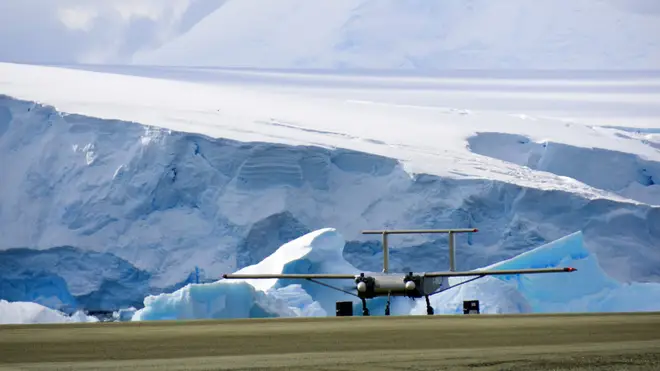
Oli Dugmore 4am - 7am
3 February 2024, 14:54

The drones are being tested at the largest British Antarctic facility, the Rothera Research Station.
Pilotless drones are being tested in Antarctica with the aim of using them to carry out scientific research.
A test crew has arrived at the largest British science facility on the continent, the Rothera Research Station.
The British Antarctic Survey (BAS) said successful tests will allow the drones to undertake research such as surveying marine ecosystems and studying glaciers, while reducing CO2 emissions by around 90%.

The Windracers Ultra UAV (uncrewed aerial vehicle) is a twin-engine, 10-metre aircraft which can carry up to 100kg of cargo or sensors for distances of 1,000km and does not require a human pilot to take off, fly or land as it is equipped with a sophisticated autopilot system.
Unlike piloted Twin Otter aircraft, which are costly to operate and face logistical challenges in the extreme environment, the BAS said the “ground-breaking” unmanned drones are safer and “could enable dramatic increases in flight time”.
The drones, which will also investigate tectonic structures and the way the ocean and atmosphere interact, are equipped with AI-driven Swarm technology, allowing multiple UAVs to organise themselves as a single system. This could allow them to collect data over large areas.
The BAS, a part of the Natural Environment Research Council (NERC), is the UK’s polar research institute and has said it plans to automate its science platforms and reach net zero carbon emissions by 2040.
Dr Tom Jordan, a BAS geophysicist specialising in airborne data collection, said the technological developments were “really exciting”.
“Polar science urgently needs extensive new high-resolution datasets to understand the ways the Antarctic ice sheet is changing, and how this will impact communities around the world,” he added.
“This is our first step toward unlocking those logistical barriers.”
The aircraft are also designed so that they can continue to fly if an engine or other components are damaged, and can be fixed with a minimal number of parts.
The project is funded by non-departmental public body Innovate UK’s Future Flight 3 Challenge, sharing £73 million in funding with 16 other projects.